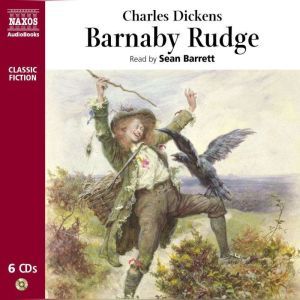

Barnaby Rudge
Author: Charles Dickens
Narrator: Sean Barrett
Abridged: 7 hr 18 min
Format: Digital Audiobook Download
Publisher: Naxos
Published: 03/02/2009


Author: Charles Dickens
Narrator: Sean Barrett
Abridged: 7 hr 18 min
Format: Digital Audiobook Download
Publisher: Naxos
Published: 03/02/2009
Charles Dickens was born on February 7, 1812, in Portsmouth, England, where his father was a naval pay clerk. When he was five, the family moved to Chatham, near Rochester, another port town. He received some education at a small private school but this was curtailed when his father's fortunes declined.
When Dickens was ten, the family moved to Camden Town, and this proved the beginning of a long, difficult period. When he had just turned twelve, Dickens was sent to work for a manufacturer of boot blacking, where for the better part of a year he labored for ten hours a day, an unhappy experience that instilled him with a sense of having been abandoned by his family. Around the same time Dickens's father was jailed for debt in the Marshalsea Prison, where he remained for fourteen weeks. After some additional schooling, Dickens worked as a clerk in a law office and taught himself shorthand; this qualified him to begin working in 1831 as a reporter in the House of Commons, where he became known for the speed with which he took down speeches.
By 1833 Dickens was publishing humorous sketches of London life in the Monthly Magazine, which were collected in book form as Sketches by "Boz". These were followed by the publication in installments of the comic adventures that became The Posthumous Papers of the Pickwick Club, whose unprecedented popularity made the twenty-five-year-old author a national figure. In 1836 he married Catherine Hogarth, who would bear him ten children over a period of fifteen years. Dickens's energies enabled him to lead an active family and social life, including an indulgence in elaborate amateur theatricals, while maintaining a literary productiveness of astonishing proportions. He characteristically wrote his novels for serial publication and was himself the editor of many of the periodicals in which they appeared, including Bentley's Miscellany, the Daily News, Household Words, and All the Year Round. Among his close associates were his future biographer John Forster and the younger Wilkie Collins, with whom he collaborated on fictional and dramatic works. In rapid succession he published Oliver Twist, Nicholas Nickleby, The Old Curiosity Shop, and Barnaby Rudge, sometimes working on several novels simultaneously.
Dickens's celebrity led to a tour of the United States in 1842. There he met Henry Wadsworth Longfellow, Washington Irving, William Cullen Bryant, and other literary figures, and was received with an enthusiasm that was dimmed somewhat by the criticisms Dickens expressed in his American Notes and in the American chapters of Martin Chuzzlewit. The appearance of A Christmas Carol in 1843 sealed his position as the most widely popular writer of his time; it became an annual tradition for him to write a story for the season, of which the most memorable were The Chimes and The Cricket on the Hearth. He continued to produce novels at only a slightly diminished rate, publishing Dombey and Son in 1848 and David Copperfield in 1850.
From this point on, his novels tended to be more elaborately constructed and harsher and less buoyant in tone than his earlier works. These late novels include Bleak House, Hard Times, Little Dorrit, A Tale of Two Cities, and Great Expectations. Our Mutual Friend, published in 1865, was his last completed novel and perhaps the most somber and savage of them all. Dickens had separated from his wife in 1858-he had become involved a year earlier with a young actress named Ellen Ternan-and the ensuing scandal had alienated him from many of his former associates and admirers. He was weakened by years of overwork and by a near-fatal railroad disaster during the writing of Our Mutual Friend. Nevertheless, he embarked on a series of public readings, including a return visit to America in 1867, which further eroded his health. A final work, The Mystery of Edwin Drood, a crime novel much influenced by Wilkie Collins, was left unfinished upon his death on June 9,1870, at the age of 58.
The last book from Dickens I have read there are no more, a sad situation for us who love his works . He only wrote 14 complete novels and this the author's least liked one and most obscure. A fictional historical novel about the 1780 religious riots (of course other factors contributed), against Ca......more
In most surveys Barnaby Rudge comes out as the least read of all Dickens's novels. Yet his only other historical novel, "A Tale of Two Cities", is one of his most popular. His penultimate novel, it was written 18 years later, and has a very different tone with little humour. But Dickens's classic wi......more
Dickens's 'other' Historical novel centred round the 'no Popery' riots in the 18th century, including a romance and an unsolved murder from the past. I found this nowhere near remotely close to the genius of A Tale of Two Cities; my current (lack of) general knowledge around the 'no Popery' issues o......more
Is this the least-read Dickens novel? According to Goodreads, yes. Only 121 reviews on this one, with Martin Chuzzlewit a close second at 141. The reason? Lack of cinematic exposure hasn’t helped. Disney can’t turn an historical narrative about the Gordon Riots of 1780 into a feel-good schmaltz-fest......more
For two hundred pages this was not Barnaby Rudge, it was Barnaby Trudge and I was Barnaby Drudge but Barnaby would not budge. I had discovered why this one is The Most Unpopular Dickens Novel. He saddles himself with a gaggle of low-class comedy characters, a couple of tiresome feeble pairs of young......more